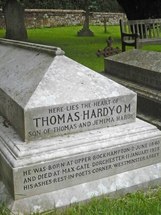day by day: a blog
December 31, 2008
dark, dark, darkling
 [image: Noël Kingsley] I got interested, for obvious reasons, in reading Hardy's "The Darkling Thrush". There is a discussion about the poem, initiated by Robert Pinsky, going on at Slate's "The Fray" at the moment. I do not much like the idea of a "Fray" over a poem. Somehow, I think one should aim for comments that have a "take-it-or-leave-it" quality rather than a "let's-discuss" cast. But I contributed something. Here it is:
[image: Noël Kingsley] I got interested, for obvious reasons, in reading Hardy's "The Darkling Thrush". There is a discussion about the poem, initiated by Robert Pinsky, going on at Slate's "The Fray" at the moment. I do not much like the idea of a "Fray" over a poem. Somehow, I think one should aim for comments that have a "take-it-or-leave-it" quality rather than a "let's-discuss" cast. But I contributed something. Here it is:
The strength of any piece of writing lies in its power to generate disagreement. By this measure, "The Darkling Thrush" is strong.
It's a mistake with any lyric to look too rapidly in it for a message or a takeaway. That's the best way to miss such great details as the perceptual sequence by which Hardy's poem so sensitively captures "noticing". He shows that the way people usually see birds is first by hearing "a voice" and only then, by turning their gaze in the direction of the sound and scrutinizing the trees, glimpsing a "gaunt, and small" creature which is singing in a way strangely at odds with its fragile appearance. Then we turn away again or let our minds wander, precisely as the poem does here, because, emotionally speaking, the sound of the birdsong always amounts to so much more than the sight of the bird. Hardy gives us hearing preceding, and succeeding, seeing, which for denizens of a culture obsessed with ocular truth, feels like a moment of liberation.
If I wander around in the interior of the poem rather than rushing banally to its end for the deeply enigmatic conclusion, what strikes me is how complex and obsessive Hardy's fascination with boundaries is here. He sets himself on thresholds of time – large ones, the turn from the 19th to the 20th century, and, more local ones, the transition from day to night. (Incidentally, it's a wonderful "late afternoon" poem; which is a very rare time for poetry to describe, no doubt that's partly the attraction for Hardy.) He also positions himself between spatial axes, leaning, and thus neither fully upright nor prone, and on a spatial threshold – the gate. Moreover, we're at the interface of nature and culture, since a coppice is a small wood, where trees are allowed to grow for the purpose of being periodically cut for human use.
These checks, borders and encountered limits, the varying points of demarcation and contrast, some of which the reader only notices subliminally at first, are what bank up the emotion which is suddenly, almost violently released in that shining word "illimited".
Hardy's speaker – I use that term not to play dull epistemological games but just to gesture towards the exquisite dramatic calibrations Hardy manipulates; this is anything but a spontaneous, unpremeditated overflow of powerful feeling – can't quite bring himself madly, ecstatically to "fling his soul" into the growing gloom in the way the thrush seems to. Nor can he quite make himself step out of the tangible, solid world of fences, paths, hedges. Or liberate himself from well-organized stanzas and rhymes. But the poem trembles at its own brinks, emotional, sensory, literary. Look at those beautifully uncomfortable off-rhymes: "coppice gate"/"desolate" (nobody reading the poem sensitively will say "dess-oh-layte"), "seemed to be"/"canopy", or "among"/"evensong". Or at the way that each of the first two stanzas is made from two relatively crudely soldered-together quatrains, whereas each of the last two stanzas, under the influence of the speaker's simultaneous excitement at and distrust of the bird's song, melts into a single, more fluid, but still not completely deliquescent sentence.
Hardy uses these subtle chafings at self-imposed limits to show his words stretching, deliberately ineffectually, towards the ineffable which can, if conditions are right, be intuited but not spoken. Perhaps that's what modern poetry is? A via negativa, a lonely haunting of once-sacred spots, an overhearing of a strange, unsanctioned music which might or might not any longer be redemptive, a "desolate" searching in the fading light for numinous signs? The authenticity of the experience in "The Darkling Thrush", as in so many Hardy poems, comes not from fulfillment but doubt, not from messages but withholdings, from a mind showing how it is possible to dwell in uncertainties, to find beauty (of a kind) in absences and, if they are seized hold of in language acutely enough, poetry in the very feelings of finitude, incomprehension and unawareness.
Posted by njenkins at December 31, 2008 03:32 AM
With the exception of interspersed quotations, all writing is © 2007-09 by Nicholas Jenkins